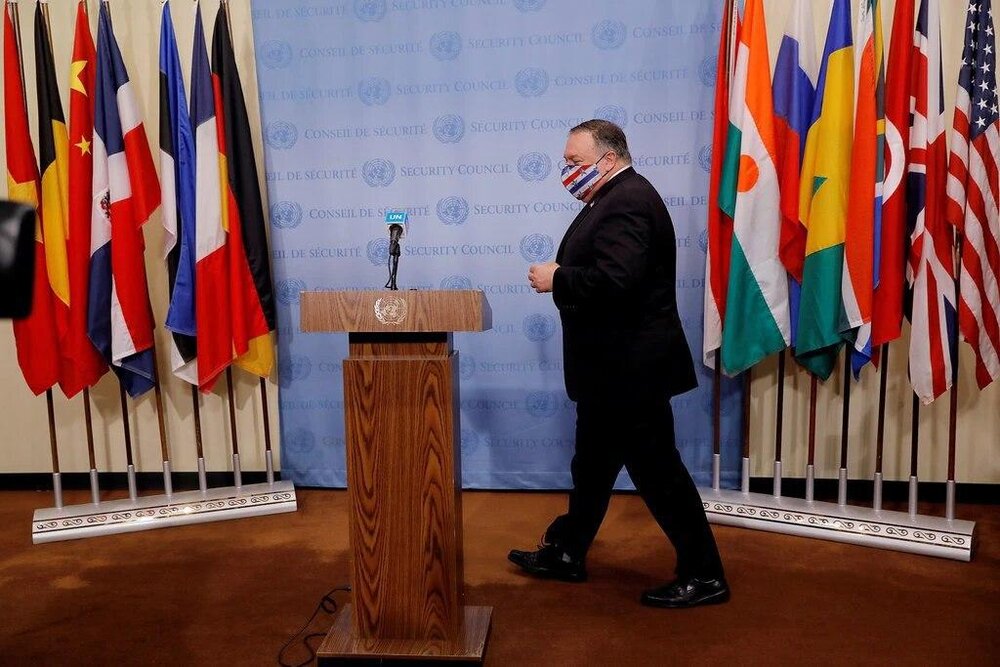Instead of isolating Iran, U.S. finds itself on the outside over nuclear deal: NY Times

A diplomatic standoff over restoring international sanctions against Iran may be the most vivid example yet of how the United States has largely isolated itself from the world order — instead of isolating Tehran, as the Trump administration intended, The New York Times said on Thursday.
At nearly every step President Trump has taken in his dogged pursuit to demolish a 2015 accord limiting Iran’s nuclear program, he has run into opposition, including from America’s strongest allies in Europe.
On Thursday, the opposition turned into open defiance.
Secretary of State Mike Pompeo traveled to New York to personally demand that the United Nations Security Council “snap back” the sanctions on Iran for violating some terms of the nuclear deal. The act was born of frustration: His closest allies had rejected an American effort to recast the terms of the deal by extending an arms embargo against Iran that begins to expire in October. Only the Dominican Republic voted with the United States.
Mr. Pompeo, sounding incredulous, again accused Iran of fomenting terrorism, destabilizing west of Asia and trying to hide its nuclear and weapons programs from international inspectors. But he directed some of his harshest words toward diplomats from Britain, France, and Germany, whom he said “chose to side with ayatollahs”.
“It’s not a matter for anger or frustration,” Mr. Pompeo said. “We’ll follow the rules of the UN Security Council, and that will lead to the sanctions being reimposed.”
Never mind that Iran’s major violations were in response to Trump’s decision to exit the nuclear agreement. And set aside the legal contortion that underpins America’s insistence that it is still a “participant” in the international accord, with the authority to restore the economic penalties, despite Trump declaring in 2018 that he was “terminating United States participation.”
The bigger issue is that even if Pompeo succeeds, he may be reimposing sanctions that no U.S. allies are willing to enforce. And that could not only weaken American authority worldwide, it may also show adversaries how to sidestep the United Nations in future global disputes.
“We call on all UNSC members to refrain from any action that would only deepen divisions in the Security Council or that would have serious adverse consequences on its work,” diplomats from Britain, France and Germany wrote in a joint statement issued moments after Pompeo spoke.
They maintained that since the United States left the nuclear agreement, it has no right to act under its provisions. “We cannot, therefore, support this action,” the European diplomats wrote.
The rejection last week by the Security Council of the arms embargo issue has already been wrapped up in election-year politics: Pompeo was quick to note that the nuclear agreement had been reached by the “Obama-Kerry-Biden” triumvirate.
But in making his point, Pompeo further fractured the group of nations that negotiated the original accord with Tehran.
“They are pushing our allies (Europeans) to balance against us, along with our adversaries (China and Russia),” said Jon B. Alterman, a geostrategy and security expert at the Center for Strategic and International Studies in Washington. “It’s unthinkable to me why you would intentionally lose a fight like this, at the UN.”
Pompeo is instead preparing to declare victory.
Wielding a veto threat to dissuade defectors, he has demanded that UN sanctions be restored on Iran’s energy, military, and financial industries.
Britain, France, and Germany have largely been left to hold the accord together, creating festering diplomatic resentments and fueling perceptions of the United States as an unreliable partner. The countries cite a different legal technicality in the nuclear deal to prevent Trump from forcing through international sanctions.
In January, after Iran began compiling and enriching nuclear fuel beyond the limits of the agreement, European officials formally accused Tehran of violating the deal. That set off a dispute mechanism that is part of the 2015 accord. A Security Council diplomat said it must be resolved before international sanctions were restored.
Negotiations between Europe and Iran continue without a deadline for completion.
Pompeo isn’t waiting. He claims the agreement allows the United States to act, regardless of whether it has declared it is leaving the accord.
Yet Wendy R. Sherman, the chief American negotiator during the Obama administration, said the United States “does not have standing” to restore the sanctions and was unlikely to convince European diplomats that it did.
“I believe they will try anyway,” Sherman said of the Trump administration during an appearance at the Atlantic Council on Wednesday.
She said the United States could undercut its own authority, especially if it defied other world powers, including allies, that refused to enforce the sanctions. “And that’s a problem of tremendous significance,” Sherman said.
In a six-page notification submitted on Thursday to Dian Triansyah Djani of Indonesia, the Security Council president, the Trump administration said the sanctions would be reimposed against Iran after 30 days. Officials said the sanctions could be blocked only by a Security Council resolution, which the United States has the power to veto.
“The U.S. shouldn’t try its luck. The result will be another humiliation,” said Iran’s UN ambassador, Majid Takht-Ravanchi.
At the United Nations, Pompeo downplayed the specter of a confrontation with allies. Other diplomats compared the standoff to a frosty system of parallel universes, in which the United States insists the sanctions are back in place, and the rest of the world refuses to acknowledge them. That could set off years of legal disputes in courts around the world as companies and people who do business with Iran challenge the economic penalties.
But it will not stop the Trump administration from claiming that it has done all it can to upend the nuclear accord with Iran.
